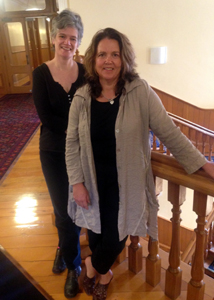Rewriting the law with a feminist lens

A project that will cast a feminist light on key judgments in New Zealand’s legal history has recently got underway, following in the footsteps of similar research in other jurisdictions.
The Feminist Judgments Project Aotearoa is being led by Victoria University Faculty of Law Associate Professor Elisabeth McDonald and Dr Rhonda Powell of the Canterbury University Law School, with funding from the New Zealand Law Foundation.
For the project, academics and practitioners will take a feminist perspective to write alternative judgments for a number of significant cases across a broad range of legal issues. Alongside each judgment, another scholar will write a commentary, providing the legal, social and political context at the time of the judgment. The outcome of the project will be an edited collection of judgments, published as a book by the end of 2017.
Associate Professor McDonald said the exercise will put theory into practice.
“These new judgments will operate as both a critique of common law method as well as a practical demonstration of how different ways of approaching a decision-making task is possible.
“They will also suggest new directions for the development of the common law in relation to the granting of patents, the formation of contracts, criminal liability and defences, child welfare and the application of international law by domestic courts, among others.”
The feminist judges will be working with established legal method that existed at the time the decision was originally made—rather than applying today’s values and practices—to produce “authentic” judgments.
Associate Professor McDonald said initial interest in the project had been significant and she was confident a broad range of cases from different eras in New Zealand’s legal history would be explored by a range of scholars, not just those that identify as feminist or female.
“This project is inspired by the feminist projects successfully undertaken overseas, but will be unique given the social, cultural and legal context of Aotearoa. It is really important to us that this work contains the critical voices of Māori scholars and from a mana wahine perspective,” she said.
Mamari Stephens, Senior Lecturer at Victoria’s Faculty of Law, will play a key role in the mana wahine aspect of the project.
Funding from the Law Foundation will enable Professor Rosemary Hunter from Queen Mary University of London, the leader of the English project and a key contributor to the Australian project, to participate in the Feminist Judgments Project Aotearoa. Justice Susan Glazebrook will also facilitate a judgment writing workshop.
